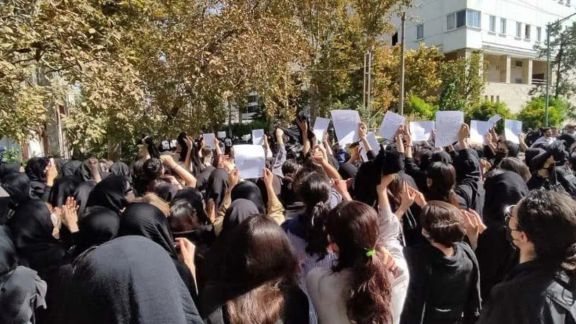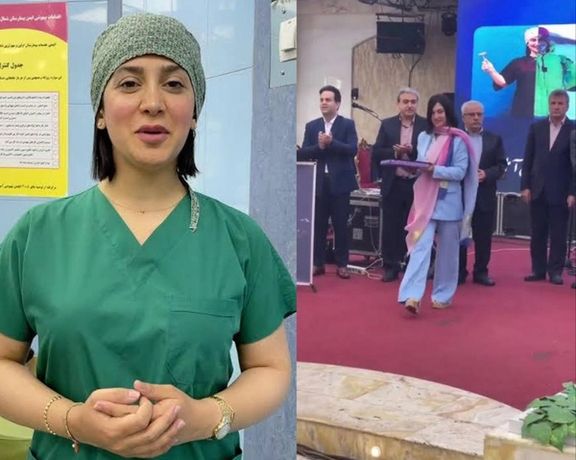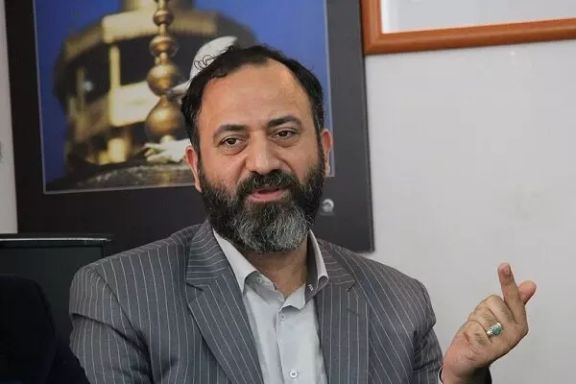Tehran University Professor Forced Out Over Support For Protests

A leading scientist has resigned from his post at an Iran university after being interrogated for voicing support for protesting students.

A leading scientist has resigned from his post at an Iran university after being interrogated for voicing support for protesting students.
Akbar Jafari was the youngest professor at Sharif University in Tehran.
A specialist in quantum materials with a position on the board of directors of the Iranian Physics Society, he faced scrutiny after expressing support for students during events in the previous year.
The news was brought to light by Ali Sharifi Zarchi, a former professor expelled from Sharif University, who reported the incident on the X network.
Zarchi detailed Jafari's resignation, stating that he formally announced his decision through a letter addressed to the Sharif faculty.
The aftermath of the 2022 protests has seen increased pressures on both students and faculty engaged in protests. The Islamic Republic's response to dissenting professors typically involves measures such as expulsion, suspension, or forced retirement.
Over recent years, there has been a notable surge in the intervention of security institutions within universities. This extends beyond students to include protesting professors, who are increasingly subjected to summoning and interrogation by university security and other related institutions.
In the wake of protests following the tragic death of Mahsa Amini, reports have surfaced regarding the recruitment of numerous individuals sympathetic to the Islamic Republic as professors in universities. The development has sparked controversy and drawn widespread attention.
Despite the recent surge in dismissals, expulsions, and suspensions of university professors and faculty members in Iran, officials from the Islamic Republic have either denied the issue or characterized its causes as non-political.

A dental surgeon in Iran who refused to wear hijab at an honorary ceremony has been expelled from her medical university.
Fatemeh Rajaei-Rad revealed she had received an expulsion order from Amol University of Medical Sciences in a post on her Instagram account on Tuesday.
She had come to public attention earlier this year when she declined to wear hijab in attending a ceremony at which she was awarded the title of Exemplary Surgeon.
The video of her attendance without a hijab circulated widely on social media, eliciting praise for her courage from many Iranians.
However, it also drew condemnation from government officials, including Supreme Leader Ali Khamenei's representative in Mazandaran province and the Friday Prayer Imam of Amol, who called for "severe action" against her.
Following the ceremony, Fars News Agency reported that Rajaei-Rad was summoned to the prosecutor's office in Amol and was denied access to Babol University of Medical Sciences, where she was teaching.
Additionally, three managers from the health department of Babol city were dismissed due to their perceived lack of reaction to Rajaei-Rad's presence without hijab during the ceremony.
Under mounting pressure, some government-affiliated media released a video in which Rajaei-Rad purportedly "apologized" for causing discomfort and insult to those "who observe complete hijab." It follows the well-documented history of the security and intelligence apparatus of the Islamic Republic using "coerced confessions" from critics, opponents, and protesters.

Mahsa Amini was given the 2023 Sakharov Prize for Freedom of Thought posthumously at a ceremony in Strasbourg on Tuesday.
The European Parliament awarded the prestigious prize to both the student who was killed by Iranian police, and the Woman Life, Freedom protest movement.
Saleh Nikbakht, an academic and lawyer representing Mahsa Amini's family, along with Afsoon Najafi, and Mersedeh Shahinkar, Iranian women's rights defenders who left Iran in 2023, stood as representatives for the laureates.
Opening the award ceremony, European Parliament President Roberta Metsola announced: “This years’ Sakharov prize… serves as a tribute to all the brave and defiant women, men and young people in Iran, who despite coming under increasing pressure, are continuing the fight for their rights and push for change.ʺ
On September 13, 2022, Mahsa, a 22-year-old Iranian Kurdish woman, was apprehended by Tehran police for purportedly defying Iran's mandatory hijab. She succumbed to injuries inflicted during her time in custody, dying in the hospital three days later.
The death of Amini sparked nationwide protests predominantly led by women.
En route to France to accept the Sakharov Prize for Freedom of Thought on December 8, the parents and brother of Amini were met by a roadblock at Tehran airport where Iranian authorities halted them and confiscated their passports.
In Strasbourg, the family was represented by their attorney, Saleh Nikbakht, who relayed a message from Amini's mother, Mozhgan Eftekhari saying: “Mahsa’s grief is eternal to me, and she is undying for people all over the world. I firmly believe that her name, beside that of Joan of Arc, will remain a symbol of freedom.”
Established in 1988, the Sakharov Prize for Freedom of Thought, named in honor of Soviet physicist and political dissident Andrei Sakharov, is awarded each year by the European Parliament to honor individuals and organizations defending human rights and fundamental freedoms.

Iranians are posting dance videos on social media in support of a man who is being prosecuted for singing and dancing in the street and posting the videos on Instagram.
The fishmonger, Sadegh Bagheri (aka Boughi) in his late sixties, became an Instagram celebrity in recent months after videos of his folk songs and dance at the bazaar in the city of Rasht, a Caspian coastal city in northern Iran, went viral on social media.
Bagheri’s dance attracted the attention of shoppers who often circled around him and his fishmonger friends, clapped to the music, and sometimes joined in the happy dance.
Last week, police reportedly detained not only Bagheri, but also a dozen other Instagram influencers in Rasht for posting Bagheri’s videos. Authorities also took over the accounts of these individuals, removed all content and posted a notice that said the activity of these accounts had been aborted for “criminal content”.
Immediately after authorities shut down the fishmonger’s Instagram page, social media users posted tens of videos that showed people dancing in parks and streets to the same tune to show their solidarity with Bagheri.
Spectators joining in Bagheri performance outside his shop
Dancing is considered as debauchery by religious fundamentalists and hence falls under the category of completely unacceptable behavior. The fundamentalist religious establishment that has very close ties to political hardliners in power also strongly objects to most music, particularly lively pop music usually associated with dance.
The deputy police commander of Gilan Province, Brigadier-General Hossein Hassanpour, told the media that police had acted because the distribution of the videos of Bagheri’s dance in the bazaar of Rasht in social media had “violated public morals” and “broke norms”.
Four shops involved in the singing and dancing were shut down, too, he added.
Many have pointed out on social media that authorities did not take legal action against officials in the same city who were involved in a same-sex scandal or object to the state broadcaster’s employment of celebrities whose lifestyles are completely against the establishment’s proclaimed morality. Instead, they arrest people like the “happy old man” for dancing outside his shop, claiming that the society’s morality was under attack.
Girls imitating Bagheri’s happy dance in a park
Boundaries of what music is acceptable in the Islamic Republic and what is not are very murky. Iran has a national orchestra and numerous concerts are held across the country every year but due to the objection of the religious establishment in over four decades the state broadcaster has never shown any actual musical instruments or orchestras in action.
Politically influential fundamentalist religious leaders such as the imam of the religious city of Mashhad often dictate the rules in their territories. A concert held in Tehran and other cities without any problems, therefore, can easily be cancelled in a city such as Mashhad. These fundamentalists are backed by Supreme Leader Ali Khamenei and imams, such as the fiery Ahmad Alamolhoda in Mashhad have been appointed by the 84-year-old ruler.
The action taken against the singing and dancing fishmonger in Rasht is said to have been prompted by the city’s Friday imam.
Animation celebrating Bagheri’s happy dance
Pointing out that all institutions of power in the country are currently in the hands of like-minded officials, a commentary in the reformist Ham-Mihan newspaper argued that a “single entity” is responsible for everything that is happening in the country now such as the arrest of the “happy old [dancing] man”, the Mashhad subway CCTV scandal, and Tehran subway “horror tunnels”.
By suppressing people, the “single entity” that has control over all institutions of power, the commentary in Ham-Mihan said, is sending a message to all, clear and with no reservation, that it determines everything that people are allowed or forbidden to do. “You can dance when I tell you.

A former hijab watchdog official is being detained facing a possible death sentence for homosexuality after a video showed him having sex with another man.
Reza Seqati, the former director-general of the culture ministry in Gilan province, is being held in detention, according to Mizan News Agency, affiliated with the Iranian judiciary.
On Monday, the criminal court in Tehran issued the detention order after investigating and evaluating the case.
In July, Seqati was dismissed from his official post after a video showing him engaging in sex with an unidentified man surfaced, potentially leading to the death penalty under Iranian law. Mizan referred to the video as the "indecent film in the Gilan case" and verified Seqati's involvement.
Senior Iranian lawmaker Hassan Norouzi called for the death penalty for Seqati in October, saying. "If the allegations against Reza Seqati are substantiated, there is an unequivocal necessity for imposing stringent consequences. He must face the full force of the law and be shoved off the mountain and be killed to teach a lesson to others."
Seqati, reported to be married with three daughters, was once recognized as a fervent supporter of compulsory hijab regulations in Gilan. Back in May, he declared the inauguration of a hijab hypermarket in the province and initiated efforts to set up a hijab exhibition at Rasht's central exhibition hall, emphasizing the production of clothing aligning with "Iranian-Islamic culture."
Reports last month hinted at Seqati assuming a new position, which the ministry promptly denied.
Some speculate that Seqati's arrest, several months after the incident, is a response to public criticism regarding the lack of arrests in the Debsh tea corruption case. Allegedly involving the embezzlement of funds from the Debsh Tea Company, the $3.5 billion corruption scandal implicates ministers of agriculture and industry, as well as the heads of the Central Bank of Iran and Iranian Customs Administration.

Mojgan Eftekhari, the mother of Mahsa Amini, strongly denounced the authorities for obstructing their family's departure for France to receive the Sakharov Prize.
On Friday, as Amjad Amini, Mojgan Eftekhari, and Ashkan Amini, the father, mother, and brother of Mahsa Amini, were en route to France for the Sakharov Prize ceremony, they were informed at the airport about the travel prohibition, with their passports confiscated.
Mahsa Amini, a 22-year-old woman, was detained by Iran's morality police in mid-September 2022, leading to her tragic death within three days of critical head injuries, sparking nationwide protests.
Expressing her frustration on Instagram, Eftekhari questioned the government's ignorance, stating, "How clueless the rulers are, not realizing the impact of Mahsa's name?" She labeled the Iranian officials as "deceptive rulers," accusing them of consistently attempting to erase Mahsa's indelible memory through deceitful maneuvers.
Earlier, Roberta Metsola, the President of the European Parliament, urged the Islamic Republic to lift the travel ban imposed on Mahsa Amini's parents and brother.
The European Union declared on October 19 that Mahsa Amini and the Women, Life, Freedom movement would be recipients of the Sakharov Prize.
The Amini family has faced heightened security pressure since Mahsa's death in the custody of the morality police, coinciding with the onset of the Iranian people's uprising against the Islamic Republic.